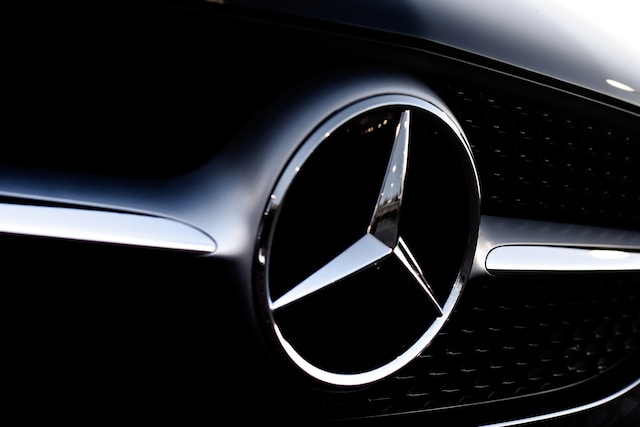Before we dive deep into the PESTEL analysis, let us get the business overview of Mercedes Benz. Mercedes-Benz is a global luxury automobile brand and a German company Daimler AG division. The brand is known for its high-quality vehicles, including cars, trucks, buses, and vans, catering to diverse customers worldwide. Mercedes-Benz traces its origins back to 1886 when Karl Benz invented the first gasoline-powered automobile, the Benz Patent-Motorwagen.
Business Segments:
- Passenger Cars: Mercedes-Benz is a leading player in the luxury passenger car market, offering a wide range of vehicles, including sedans, coupes, convertibles, SUVs, and electric vehicles. Popular models include the C-Class, E-Class, S-Class, and the AMG high-performance lineup.
- Vans: Mercedes-Benz Vans division manufactures light commercial vehicles, such as the Sprinter, Vito, and Citan, catering to various industries like logistics, construction, and tourism.
- Trucks: The Mercedes-Benz Trucks division produces heavy-duty trucks, including the Actros, Arocs, Atego, and Econic models, which cater to industries such as logistics, construction, and waste management.
- Buses: Mercedes-Benz produces a range of buses, including city buses, intercity buses, and touring coaches, under the brands Mercedes-Benz, Setra, and BharatBenz.
- Electric Mobility: The EQ sub-brand focuses on developing and producing electric vehicles (EVs) and related technologies. Models under this brand include the EQC, EQA, and EQS.
- Financial Services: Mercedes-Benz Financial Services provides financing, leasing, and insurance solutions to customers and dealers, supporting the sales of Mercedes-Benz vehicles and services.
Mercedes-Benz geographically operates in various regions, including Europe, North America, Asia-Pacific, the Middle East, and Africa. The brand’s global presence and diversified portfolio have contributed to its position as a market leader in the luxury automobile segment.
Financial Performance 2022: Mercedes-Benz Group AG’s sharpened focus on high-end passenger cars and premium vans, combined with tight cost control, helped to lift Earnings Before Interest and Taxes (EBIT) by 28% to €20.5 billion (2021: €16.0 billion) last year, outpacing a 12% rise in revenue to €150.0 billion (2021: €133.9 billion) during the same period.
Here is the PESTEL analysis of Mercedes Benz
A PESTEL analysis is a strategic management framework used to examine the external macro-environmental factors that can impact an organization or industry. The acronym PESTEL stands for:
- Political factors: Relate to government policies, regulations, political stability, and other political forces that may impact the business environment.
- Economic factors: Deal with economic conditions and trends affecting an organization’s operations, profitability, and growth.
- Sociocultural factors: Relate to social and cultural aspects that may influence consumer preferences, lifestyles, demographics, and market trends.
- Technological factors: Deal with developing and applying new technologies, innovations, and trends that can impact an industry or organization.
- Environmental factors: Relate to ecological and environmental concerns that may affect an organization’s operations and decision-making.
- Legal factors: Refer to the laws and regulations that govern businesses and industries.
In this article, we will do a PESTEL Analysis of Mercedes Benz.
PESTEL Analysis Framework: Explained with Examples
Political
- Tariffs and Trade Regulations: Mercedes Benz, being a global brand, relies on smooth international trade. Any new tariffs or trade barriers imposed can increase the cost of importing or exporting cars and parts, affecting their pricing strategy and profitability.
- Governmental Stability: Countries with unstable political environments can be risky markets for luxury brands like Mercedes Benz. Political unrest, frequent changes in leadership, or policies can affect sales, operations, and the brand’s reputation.
- Emission and Environmental Regulations: Governments worldwide are becoming stricter about vehicle emissions due to increasing concerns about climate change. For Mercedes Benz, this means investing in cleaner technologies, including hybrid and electric cars.
- Taxation Policies: Changes in tax policies, such as incentives for electric vehicles or higher taxes on luxury goods, can influence Mercedes Benz’s sales and strategic decisions.
- Infrastructure Development: Governments’ investments in infrastructure, like roads and transport facilities, can impact the auto industry. Good infrastructure boosts the automotive industry, while poor infrastructure might deter people from buying cars.
- Safety Regulations: Governments may introduce or modify safety regulations for vehicles. Mercedes Benz, known for its commitment to safety, must always adhere to these regulations, sometimes involving design, features, or technology changes.
- Foreign Policy & Relations: Being a German brand, Mercedes Benz can be impacted by Germany’s foreign relations. If Germany faces diplomatic tensions with another country, it might affect Mercedes’ operations in that particular country.
- Incentives for Green Technologies: As governments worldwide push for greener technologies, there may be incentives for companies to develop electric or hybrid vehicles. These incentives can help Mercedes-Benz in the research, development, and promotion of their green vehicles.
Economic
- Global Economic Health: The overall health of the global economy impacts consumer purchasing power. In times of economic prosperity, consumers are more likely to splurge on luxury items, including high-end vehicles. Conversely, during economic downturns, consumers might cut back on luxury purchases.
- Interest Rates: Interest rates set by central banks can influence consumer and business lending. Higher interest rates might deter potential buyers from taking out car loans, reducing sales for Mercedes Benz.
- Exchange Rates: As a global company, Mercedes Benz conducts transactions in various currencies. Fluctuating exchange rates can impact the cost of production (if parts are imported) and the overall profitability when cars are sold in foreign markets.
- Inflation Rates: High inflation can erode consumers’ purchasing power, reducing demand for luxury cars. It can also increase operational costs for Mercedes Benz.
- Unemployment Rates: High unemployment reduces disposable income in the population, leading to decreased demand for luxury goods, including vehicles. This can impact Mercedes Benz’s sales in affected regions.
- Consumer Confidence: If consumers are optimistic about the economy’s future, they are likelier to make big-ticket purchases like luxury cars. Conversely, if they are pessimistic, they might defer or avoid such purchases.
- Fuel Prices: While Mercedes Benz offers a range of fuel-efficient and electric vehicles, traditional fuel-based vehicle sales can be influenced by fuel prices. High fuel prices might push consumers towards more fuel-efficient or alternative fuel vehicles.
- Competition and Market Saturation: The economic landscape can influence the number and strength of competitors in the market. If there’s increased competition or if the luxury car market is saturated, it could affect Mercedes Benz’s market share.
- Credit Availability: The availability of credit and financing options for consumers can influence their ability to purchase luxury vehicles. Restrictive credit policies can hamper sales, while lenient policies can boost them.
- Governmental Economic Policies: These include subsidies, incentives, or penalties in the automotive sector. For instance, incentives for electric vehicles can boost the sales of Mercedes Benz’s electric range, while penalties for diesel vehicles might decrease the sales of such models.
Sociocultural
- Consumer Lifestyle & Values: As societies evolve, the lifestyle and values of consumers change. For instance, an increasing number of consumers today prioritize sustainability, leading to a greater demand for electric or hybrid vehicles. Mercedes Benz needs to recognize and align with these changing values.
- Brand Perception: In different cultures, luxury brands are perceived differently. While some might see Mercedes Benz as a status symbol, others might associate it with quality and safety. Ensuring a consistent and positive brand image globally is essential.
- Cultural Preferences & Aesthetics: Design and aesthetic preferences can vary across cultures. What appeals to consumers in one country might not resonate in another. Customizing or tweaking car designs to align with local tastes could be advantageous.
- Age Demographics: Different age groups have varying preferences and needs. As the global population ages, there might be a demand for specific features that cater to older drivers. Conversely, a younger demographic might demand tech-heavy, modern designs.
- Attitudes Toward Mobility: Urbanization, traffic congestion, and the growing trend of shared mobility can influence car ownership attitudes. There might be a reduced demand for personal cars in heavily urbanized areas.
- Environmental Consciousness: Increasing awareness about environmental issues can influence consumers’ vehicle choices. This might lead to a preference for vehicles with lower emissions or those using alternative energy sources.
- Gender Dynamics: In some cultures, there’s a rising trend of women participating in the workforce and becoming key decision-makers in car purchases. Understanding gender dynamics and preferences can influence marketing and design strategies.
- Safety Concerns: Societal concerns about safety can influence consumer choices. Given Mercedes Benz’s strong reputation for safety, emphasizing this in markets with heightened safety concerns can be a strategic move.
- Income Distribution: In societies with widening wealth gaps, the market for luxury goods can be polarized. Understanding income distribution can help Mercedes Benz target its products more effectively.
- Cultural Events and Celebrations: Participating in or leveraging cultural events, festivals, or local celebrations can enhance brand visibility and relevance in particular regions.
Technological
- Advancements in Vehicle Technology: As technology progresses, consumers expect vehicles to feature the latest innovations. This includes advancements in infotainment systems, autonomous driving features, and integrated AI systems.
- Electric and Hybrid Technologies: The push towards sustainability has accelerated the development and adoption of electric and hybrid vehicles. Like other manufacturers, Mercedes Benz invests heavily in this space to meet global demands and regulatory requirements.
- Manufacturing Automation: Using robots and automation in manufacturing processes can increase efficiency, reduce costs, and ensure consistent quality. Mercedes Benz continuously adapts and innovates in its manufacturing processes to maintain its reputation for quality.
- Data Analytics and AI: Data-driven insights can aid in understanding consumer preferences, predicting market trends, and enhancing vehicle safety. AI can be incorporated into vehicle systems for better user experiences.
- Connectivity: The rise of the Internet of Things (IoT) has led vehicles to become more connected internally and externally. Features like remote vehicle monitoring, over-the-air updates, and integrated car-to-car communication are becoming standard.
- 3D Printing: In the automotive sector, 3D printing can revolutionize the production of parts, allowing for quicker prototyping and the possibility of more customized vehicle components.
- Shared Mobility and Ride-Hailing Platforms: With the emergence of platforms like Uber and Lyft, there’s a shift in the perception of car ownership, especially in urban areas. Mercedes Benz might need to explore collaborations, develop vehicles tailored to this market, or even introduce their platforms.
- Augmented Reality (AR) and Virtual Reality (VR): These technologies can enhance the customer buying experience. For example, virtual showrooms can allow customers to experience a car model without physically visiting a showroom.
- Cybersecurity: As vehicles become more connected, cyber-attack threats become a significant concern. Mercedes Benz must invest in robust cybersecurity measures to ensure the safety and trustworthiness of their vehicles.
- Supply Chain Technology: Advanced supply chain management systems can streamline operations, reduce costs, and ensure timely availability of parts and vehicles. Blockchain, for instance, can enhance transparency and traceability in the supply chain.
Environmental
- Emission Standards: Globally, governments are imposing stricter emission standards to combat air pollution and climate change. Mercedes Benz needs to ensure its vehicles comply with these standards, which might require investments in cleaner technologies.
- Transition to Electric Vehicles (EVs): The shift toward greener alternatives like EVs is accelerating. Mercedes Benz is investing in electric technology, understanding the importance of offering environmentally friendly vehicle options.
- Resource Scarcity: The availability and price volatility of certain resources, like rare earth metals used in batteries, can impact the production costs and strategies for electric and hybrid vehicles.
- Recycling and Waste Management: As sustainability becomes a priority, there’s increased emphasis on recycling components and managing waste during the vehicle manufacturing process.
- Environmental Activism and Consumer Behavior: Consumers increasingly make purchasing decisions based on a company’s environmental track record. Mercedes Benz must highlight and genuinely work on its sustainability initiatives to appeal to this environmentally conscious market segment.
- Natural Disasters and Climate Change: Climate change leads to unpredictable weather patterns and natural disasters, disrupting manufacturing processes and supply chains and even impacting key markets.
- Alternative Fuels: Beyond electric power, research’s ongoing into alternative fuels like hydrogen fuel cells. Keeping abreast of these technologies and potentially incorporating them can diversify Mercedes Benz’s vehicle lineup.
- Sustainable Supply Chain: There’s a push for products and supply chains to be sustainable. Mercedes Benz might need to scrutinize its suppliers to ensure they adhere to environmental standards, adding another layer to the procurement process.
- Regulatory Penalties: Failure to comply with environmental regulations can result in hefty fines and damage to reputation. As a global brand, Mercedes Benz needs to be aware of and comply with environmental laws across different countries.
- Green Infrastructure: As electric vehicles become mainstream, there’s a need for infrastructure like charging stations. Mercedes Benz could consider partnerships or investments in this area to facilitate the adoption of its electric models.
Legal
- Safety Standards: Automobile manufacturers like Mercedes-Benz must comply with stringent vehicle safety standards in every country they operate. These standards dictate various aspects, from airbag requirements to brake systems.
- Emissions Regulations: Governments worldwide are imposing tighter regulations on vehicle emissions. Companies failing to meet these standards can face penalties and reputational damage.
- Labor Laws: Mercedes Benz operates in multiple countries, each with its own labor laws. This includes rules related to wages, working hours, worker rights, and unions.
- Intellectual Property Laws: Protecting patents, trademarks, and designs is vital for maintaining a competitive advantage. Mercedes Benz must ensure its technological advancements and brand elements are legally protected.
- Trade and Tariff Regulations: Being a global brand, Mercedes Benz is affected by international trade laws, tariffs, and customs duties. Changes in these laws can impact the cost of exporting and importing vehicles and parts.
- Antitrust and Competition Laws: In some countries or regions, companies with significant market shares might face legal scrutiny to ensure they’re not indulging in monopolistic practices.
- Data Protection and Privacy: With the rise of connected vehicles, Mercedes Benz collects and processes significant amounts of user data. Regulations like the General Data Protection Regulation (GDPR) in Europe mandate strict data collection, storage, and usage rules.
- Environmental Regulations: Beyond emissions, there are laws related to the environmental impact of manufacturing processes, waste disposal, and resource extraction.
- Consumer Rights and Protections: These laws dictate the rights of consumers related to warranties, returns, and protections against deceptive marketing practices.
- Taxation Laws: Mercedes Benz must navigate the complex web of taxation laws in different countries, which can impact profitability. This includes laws related to sales tax, import duties, corporate income tax, and more.
- Product Liability and Recalls: If a vehicle model is found to have defects that compromise safety, manufacturers might be legally required to recall those models, incurring significant costs.











